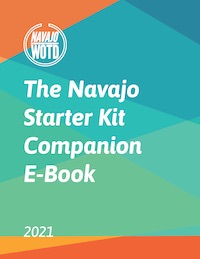dibááʼ
thirst
This Navajo term refers to thirst.
If you take the word nisin, which expressed a want or desire, you would think that the phrase dibáá’ nisin means that you “want thirst.”
But dibáá’ nisin is actually how you express “I am thirsty.”
To understand what dibáá’ means, you can take another Navajo word dibahí and compare. That word roughly expresses something that is devoid of moisture. For example, łeezh dibahí will describe the fine, powdery dust commonly found in dry pond or lake beds during a drought.
Back to thirst, there is also the phrase dibáá’ nishłį́ that translates literally to “I am thirst.” That expression might not fully express what it is intended to mean. But, by using nisin, you’re saying “thirst is on my mind” or “my mind is full of a desire – the kind associated with thirst.”
Hunger works the same way – its Navajo word is dichin.
